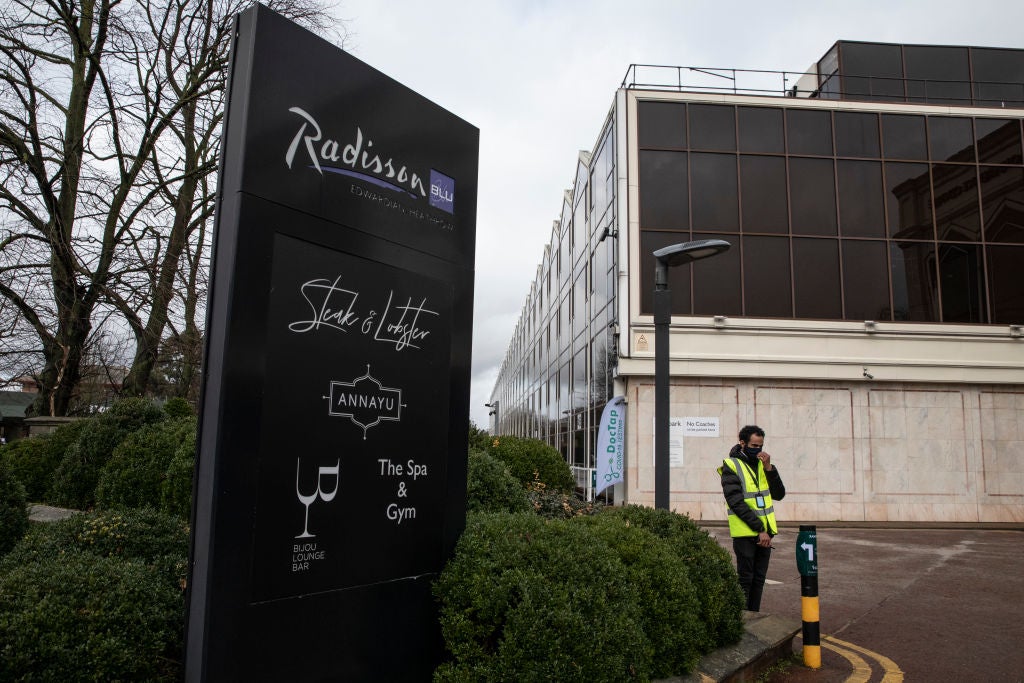Has anyone bothered to think about the staff working at quarantine hotels?
A low rate of statutory sick pay, alongside restrictions on access to financial support, means isolating from work can lead to destitution for many people in these jobs


The government’s quarantine scheme requires 11 days of hotel isolation for travelers entering the UK from a “red list” of countries. But the entire initiative risks being undermined by policies which make it impossible for workers in the hotel industry to protect themselves from the spread of infection.
We need to confront the possibility of the virus spreading between guests and staff, who must be able to take time off work to isolate if there is a risk they could have come into contact with an infected person. However, a low rate of statutory sick pay, alongside restrictions, especially for migrant workers, on access to financial support, means isolating from work can lead to destitution for many people in these jobs.
The government needs to raise statutory sick pay from £95 per week, one of the lowest in Europe and utterly insufficient to support a family for 10 days or more of isolation. It also needs to scrap No Recourse to Public Funds (NRPF), which keeps migrant workers in poverty, and expand access to its one-off isolation payments of £500. Without these measures, workers in these hotels will face the impossible choice between isolating to protect their health and feeding their families.
The hospitality sector in the UK has the highest proportion of migrant workers, making up 30 per cent of the workforce. Most migrants living and working in the UK are automatically subject to NRPF, leaving them unable to access the public safety net, including universal credit, child benefit, income support or housing benefit, regardless of their financial circumstances.
Long before the pandemic, NRPF conditions were causing severe financial hardship for migrants. For migrant workers in the hospitality sector, an industry hit particularly hard by the pandemic, job losses combined with NRPF conditions have meant they are unable to say “no” to high-risk working conditions and low pay.
Throughout this pandemic, we have seen how frontline workers, often in low-paid work, have kept our country going. Yet these are the workers who are consistently undervalued by the government and by employers, despite the fact they have kept our shops open, our transports systems running and our shared spaces clean.
The new mandatory hotel quarantine scheme is no exception. The responsibility for lowering Covid-19 transmission across our borders has fallen to low-paid hotel workers, security staff and cleaners. It is them ensuring that the scheme runs smoothly and safely. Low rates of sick pay and a reliance on the statutory minimum wage is prevalent in hospitality contracts, and even more so in cleaning and security contracts, which are often outsourced to agencies, and where insecure and zero-hours contracts are common.
Research from the Joint Council for the Welfare of Immigrants has found that migrants working in cleaning and hospitality jobs who fall under NRPF are more likely than their peers to have suffered financially during the pandemic. They report being more likely to have lost their jobs, or if they were still in work, to be unable to take time off sick due to lack of financial support.
Half of surveyed hospitality workers and 100 per cent of surveyed cleaners said they would have no sick pay at all or only Statutory Sick Pay available to them. Migrants surveyed who fall under NRPF were also more likely to be living in crowded, shared accommodation where isolation from their household would be difficult.
This cluster of dangerous conditions linked to not having access to mainstream benefits and decent sick pay should be unacceptable in normal times. During a pandemic and among the workers expected to staff quarantine hotels, it is a scandal.
The risks associated with failing to provide workers with adequate sick pay has already played out in other industries. In December 2020, a Covid-19 outbreak at Bakkavor salad factory led to the tragic deaths of two migrant workers. Union organisers noted that the outbreak was out of control quite simply because it was financially impossible for staff to test and isolate with only statutory sick pay to survive on. For many working at the factory, it was an impossible choice between being able to feed themselves, and their families, or isolating.
Meanwhile, MPs are passing down the baffling advice from ministers to their constituents, who are afraid of having to make these choices, that when statutory sick pay is insufficient, universal credit and the one-off £500 isolation support payment can be used to supplement it.
Of course, this isn’t a real solution for people in these situations. Not only are the waiting times for universal credit long, migrant workers are generally not entitled to it anyway. Meanwhile, unions have been raising the alarm over high proportions of applications for the £500 isolation payment being rejected. As eligibility is tied to the same benefits that migrants who fall under NRPF are barred from, it offers very little hope.
For the hotel quarantine system to work and keep us safe, we need cast-iron assurances that all staff working are protected with full sick pay if they need to isolate and access to all benefits and financial support, regardless of their immigration status.
More broadly, for all of us to come out of this pandemic and build a more resilient society that protects our health, we need these protections to be put in place in all workplaces. JCWI has been calling for the hostile environment for migrant workers to be scrapped, so that migrants can fall back on the public safety net just like anyone else in the event of hardship or ill health.
The risks associated with the new quarantine must be a wake-up call for the government to work it out and protect our frontline workers once and for all.
Zoe Gardner is policy advisor to the Joint Council for the Welfare of Immigrants
Join our commenting forum
Join thought-provoking conversations, follow other Independent readers and see their replies
Comments




Bookmark popover
Removed from bookmarks